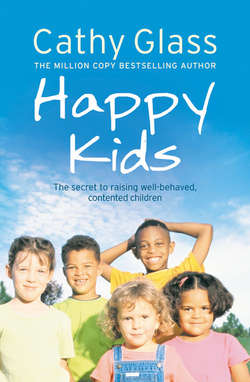Читать книгу Happy Kids: The Secrets to Raising Well-Behaved, Contented Children - Cathy Glass, Cathy Glass - Страница 29
Behaviour and character
ОглавлениеA child becomes autonomous – i.e. a self-governing individual with freedom of action – almost from the day he or she is born. Gone is the early Victorian attitude where young children were viewed as objects, lacking the adult capability to think, feel and make decisions; now we recognise that a child is an individual who is developing his or her autonomy right from the beginning and we respect his or her character. This is far healthier, but more demanding for the parents, than the Victorian ‘seen and not heard’ approach. There is a leap in autonomy when the child becomes mobile, and another huge leap when he or she starts preschool. Although seeing your child turning into a self-regulating individual with character is exciting, and a reward for all your love and attention, it can also be very challenging if your child’s character doesn’t fit snugly alongside yours or your partner’s, which it won’t sometimes.
The more your child’s world opens up, the more autonomous he or she will become, and the more obvious his or her individuality. Your child’s character, including his or her likes, dislikes, temperament, wishes, demands and refusals, all go together to make up your child. Many of your child’s character traits will gel happily with yours, while others may make you wonder exactly who this little person is. How often do you hear a shocked parent exclaim, ‘Where did that come from?!’ or ‘Where did he get that?!’ in relation to a trait in a child’s character (positive or negative) that is not part of the parent’s behaviour. Some of this will simply be part of the child growing up and experimenting with how they want to be, but other aspects will be the child’s character forming – his or her individuality and personality, which you will accommodate while maintaining the boundaries for good behaviour.
Children are not cloned; they are not physically identical to their parents. So there is no reason why their characters should be identical either. Obviously genes, environment and upbringing play a large part in shaping a child, but ultimately they will become their own person. You will find some of their character traits very appealing, while you may not like others. And while you should encourage your child’s autonomy and individuality, you should never allow the child to overrule you and your guidelines. You are the adult, and from years of experience you know what is best for your child.
As unacceptable as the badly behaved child is, so too is the precocious child, who has been brought up to believe that the whole world revolves around them, that their view is the only one and that others are there to fit in with them. The preschool age group has an abundance of this type of child whose parents have over-indulged all their whims, in the mistaken belief that they were encouraging individuality. The parents take pride in what they have done and point out the child’s resulting (precocious) behaviour to anyone who will listen:
Claire insists on having her tea at her little table in front of the television, instead of eating with us.
Tom will only wear Adidas [designer] trainers.
Claire prefers older children. She finds children her own age a bit babyish.
All of the above, and more, I have heard said recently by proud and doting parents of rising fives, who misguidedly believed they were encouraging positive individuality in their child, but were actually encouraging precociousness and storing up trouble for later. Claire should have been made to sit at the table for a family meal (using the 3Rs technique if she resisted). Tom’s materialistic attitude to footwear is likely to land him and his parents in the bankruptcy court, as well as encouraging an unhealthy emphasis on the labels of clothing rather than functionality. And for Claire to be viewing her peer group as beneath her is not only elitist and derisory but will also be a big hindrance to her making friends.
As with so much of successful parenting, it is a matter of balance. Encourage your child’s autonomy and individuality, but don’t let your child take over and take charge. At this age, with the child’s growing sense of liberation and independence, and being away from you at nursery, there is the potential for him or her to try to take the reins. If he does, you could wake up one morning to find your life totally revolving around your child’s, with your personality being swamped by theirs. If you feel this is already happening, and your control is being eroded, then rein in your child. Put in place your routine and boundaries and ensure positive and age-appropriate behaviour using the 3Rs:
* Request – your child to do something or stop doing something in a friendly but firm manner.
* Repeat your Request.
* Reaffirm – if your Request with the added warning that a sanction will follow, or give a reward if your request has been complied with. Remember that the reward need only be verbal – ‘Good girl/boy’ – but praise is always important.
